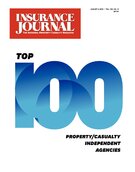The insurance industry stands at a crossroads. From emerging risks driven by climate change and cyber threats to regulatory shifts and technological disruption, professionals across the sector face challenges that demand informed perspectives and strategic thinking. In this environment, those who can articulate clear, actionable insights don’t just participate in industry conversations–they shape them.
Thought leadership has evolved from a marketing buzzword into a critical business strategy for insurance professionals. Whether you’re a wholesaler navigating capacity constraints, a retail agent explaining coverage gaps to clients, or a carrier executive positioning your organization for the future, your ability to contribute meaningful commentary to industry discourse directly impacts your professional credibility and business success.
The Currency of Expertise in a Complex Market
Today’s insurance buyers have access to more information than ever before. They expect their coverage partners to provide not only products and services, but genuine expertise and forward-thinking perspectives on risks and market trends.
This expectation creates both a challenge and an opportunity. The challenge lies in developing insights that rise above industry noise and provide real value to your audience. The opportunity lies in establishing yourself as a trusted voice in an industry that desperately needs clear thinking and practical guidance.
What Constitutes Meaningful Thought Leadership
The most impactful industry commentary typically addresses three key areas:
- Identifying trends before they become mainstream. Spotting market shifts, new risk categories, or regulatory changes early and explaining their implications before they’re widely discussed.
- Providing practical guidance for current challenges. Offering specific, actionable advice based on real-world experience rather than theoretical (or promotional) solutions.
- Offering strategic perspectives on future market directions. Connecting current developments to longer-term industry evolution and helping stakeholders prepare for what’s coming.
Building Your Platform for Industry Commentary
Consider these key platforms for sharing your expertise:
- Speaking opportunities. Industry conferences, webinars, and professional association meetings provide forums for real-time engagement with peers and the chance to position yourself as an expert on specific topics or market segments.
- Digital platforms. LinkedIn posts, industry podcasts, and specialized insurance forums have democratized thought leadership, enabling professionals to build audiences directly. The key is choosing platforms where your target audience actively engages and maintaining consistency in content quality and publishing frequency.
- Industry publications. Written commentary in established trade publications provides a foundation for thought leadership by reaching engaged professional audiences while benefiting from editorial oversight that enhances content quality and credibility.
Commentary Opportunities
Regulatory changes. The insurance industry’s heavily regulated nature creates constant opportunities for thought leadership around regulatory interpretation and compliance. New rules, enforcement actions, and regulatory guidance often leave market participants seeking clarity on practical implications. Insurance professionals who can quickly analyze regulatory changes and translate them into actionable guidance for their specific audience segments provide immense value.
Coverage innovation. Insurance product innovation offers rich territory for thought leadership, particularly as new risks emerge and traditional coverage models evolve. The rise of parametric insurance, usage-based policies, and embedded insurance products creates opportunities for experts to explain these innovations and their market implications.
Industry trends and market analysis. Successful thought leadership often involves identifying and analyzing trends before they become widely recognized. This requires staying current with industry data, monitoring regulatory developments, and maintaining awareness of broader economic and social factors that impact insurance markets.
The Credibility Factor
Thought leadership credibility in insurance stems from demonstrating deep industry knowledge combined with practical experience. Your audience needs to understand not just what you think, but why your opinion matters and how your insights can help them make better business decisions.
Building credibility takes time and requires consistent demonstration of expertise through various touchpoints. Each piece of commentary or analysis contributes to your overall reputation as a knowledgeable industry voice.
Measuring Impact and Adjusting Strategy
Effective thought leadership requires ongoing assessment of impact and audience engagement. This involves tracking both quantitative metrics (such as article views, social media engagement, and speaking invitations) and qualitative feedback (such as peer recognition, media citations, and client conversations).
The goal isn’t necessarily to achieve the highest possible visibility, but rather to build meaningful relationships with key stakeholders in your target market. Sometimes, a single, well-timed insight shared with the right audience can have more impact than months of broad-based content creation.
The Long-Term Value of Industry Commentary
Building thought leadership is an investment in your professional future. The relationships, recognition, and reputation you build through consistent, valuable industry commentary compound over time, creating opportunities that extend far beyond immediate business development goals.
The insurance industry needs more voices contributing to important conversations about risk, regulation, innovation, and market evolution.
By developing your capacity for thought leadership and consistently sharing valuable insights, you not only advance your own professional goals but also contribute to the broader industry dialogue that shapes the future of insurance.
In an industry built on expertise and trust, your insights and commentary become valuable assets that benefit both your career and the clients and partners you serve. The question isn’t whether you have valuable perspectives to share; it’s whether you’re willing to invest the time and effort required to share them effectively.
Topics Leadership
Was this article valuable?
Here are more articles you may enjoy.



 Trump’s Repeal of Climate Rule Opens a ‘New Front’ for Litigation
Trump’s Repeal of Climate Rule Opens a ‘New Front’ for Litigation  What Analysts Are Saying About the 2026 P/C Insurance Market
What Analysts Are Saying About the 2026 P/C Insurance Market  Experian Launches Insurance Marketplace App on ChatGPT
Experian Launches Insurance Marketplace App on ChatGPT  Florida Engineers: Winds Under 110 mph Simply Do Not Damage Concrete Tiles
Florida Engineers: Winds Under 110 mph Simply Do Not Damage Concrete Tiles 



